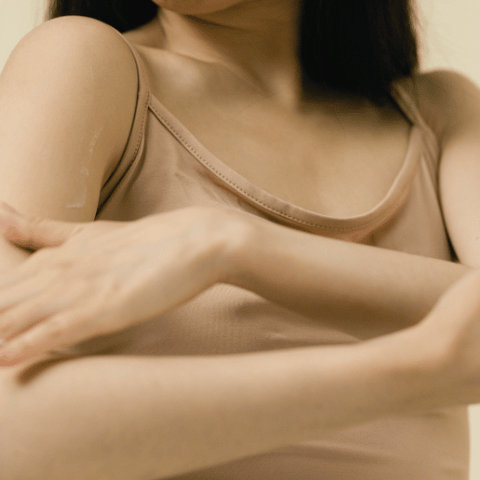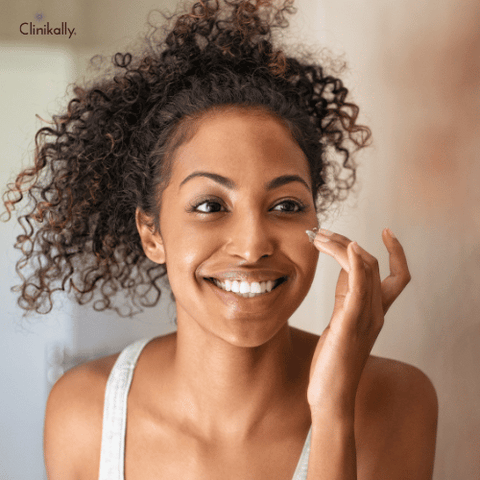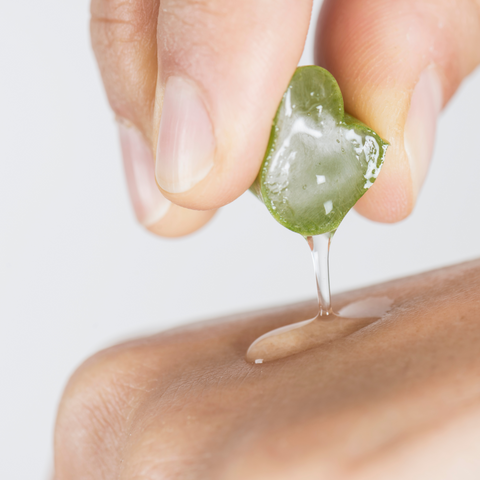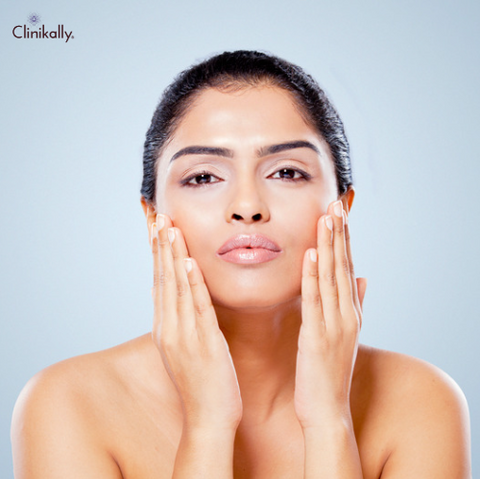Humectants are an essential ingredient class in skincare products that help to hydrate the skin. They are substances that attract and retain moisture from the surrounding environment, including water vapour in the air, to keep the skin moist and supple. When applied to the skin, humectants penetrate the outer layer of the skin, where they attract and hold water molecules to help maintain the skin's moisture balance. Glycerin, hyaluronic acid, urea, aloe vera, and Alpha Hydroxy Acids (AHAs) are several types of humectants commonly used in skincare products.
Humectants have the ability to hydrate the skin as well as enhance its tone, texture, and overall look. They are especially beneficial for people with aged, dry, or dehydrated skin, as well as individuals who suffer from specific skin problems, including eczema and psoriasis. It's crucial to remember that humectants might not be sufficient on their own to completely moisturise the skin. They function best when combined with other moisturising substances such as occlusives, which aid in stopping moisture loss, and emollients, which help soften and smooth the skin. When choosing skincare products that contain humectants, it's crucial to take into account the product's other ingredients as well as the concentration and type of humectant employed. To guarantee the best outcomes, it's also crucial to use products that are suitable for your skin type and condition.
Understanding Humectants: How They Work and Their Benefits

A group of skincare compounds known as humectants aid in hydrating the skin by drawing and holding onto water molecules. Humectants function by forming bonds with nearby water molecules, enabling them to permeate the skin's layers and support the maintenance of hydration levels. The following are some of the most popular humectants found in skin care products:
-
Glycerin: A natural humectant found in many skincare products. It attracts moisture to the skin and keeps it hydrated.
-
Hyaluronic acid: An effective humectant that has a 1000-fold water capacity. It helps to improve skin texture, fill up the skin, and lessen the visibility of fine lines and wrinkles.
-
Urea: A naturally occurring humectant that softens and moisturises the skin.
-
Aloe vera: A natural humectant that promotes skin hydration and comfort. It is frequently used in post-sun products to soothe sunburned skin.
-
Honey: A natural humectant that aids in soothing and moisturising the skin. It can be used to treat skin that is prone to acne because it also has antibacterial properties.
Humectants can generally help to increase the skin's levels of hydration, improve skin texture, and lessen the visibility of fine lines and wrinkles.
The Science of Humectants and Skin Hydration
A group of skincare chemicals known as humectants draw and hold water molecules from the environment and transport them to the skin. They function by creating a layer on the skin's surface that slows the loss of water from the skin and absorbs moisture from the air to keep the skin hydrated. Humectants permeate the skin when applied topically and assist in replenishing the natural moisture barrier, producing softer, smoother, and more supple skin. They work well at boosting skin moisture, enhancing skin texture, and lessening the visibility of fine lines and wrinkles. Hyaluronic acid, glycerin, urea, and aloe vera are a few examples of humectants that are frequently used in skin care products.
Humectants vs. Emollients and Occlusives
All three categories of skincare ingredients—humectants, emollients, and occlusives—help to keep skin hydrated, although they function in various ways. Ingredients known as humectants draw water to the skin and aid in moisture retention. They function by absorbing water from the environment and the skin's lower layers and storing it in the skin's top layers. The humectants glycerin, hyaluronic acid, and urea are frequently used in skincare products. Emollients are substances that fill in creases and crevices on the skin's surface to help soften and smooth it. They also aid in lowering skin water loss. Emollients include things like oils, butter, and silicone.
Ingredients known as occlusives help stop water loss by forming a physical barrier on the skin's surface. They function by creating a seal over the skin, stopping water evaporation. Petrolatum, mineral oil, and beeswax are a few occlusives. Generally speaking, humectants work best when combined with occlusives and emollients. Emollients and occlusives aid in sealing in moisture and improving the texture of the skin, while humectants attract moisture to the skin.
Common Humectants in Skin Care Products

Humectants are commonly used in skincare products to attract and retain moisture on the skin. The following are some of the most common humectants found in skincare products:
-
Glycerin: It is a liquid that is transparent and odourless and is made from plant oils. It keeps the skin moisturised by drawing water from the surroundings.
-
Hyaluronic Acid: The skin contains a natural material that can hold 1,000 times its weight in water and is capable of doing so. It keeps the skin moisturised and plump.
-
Urea: The skin contains this naturally occurring substance. Its potent humectant properties draw moisture to the skin and keep it moisturised.
-
Aloe Vera: A natural plant extract with moisturising properties. It soothes and hydrates the skin, making it an ideal humectant for dry and sensitive skin.
-
Honey: It draws and holds moisture to the skin because it is a natural humectant. It also has antimicrobial qualities, making it a great component for skin that is prone to acne.
-
Panthenol: It is a vitamin B5 form with moisturising qualities. It aids in enhancing the skin's ability to act as a barrier, keeping irritants and moisture out and moisture in.
-
Propylene Glycol: It is a synthetic humectant that is frequently seen in cosmetics. It draws moisture to the skin and aids in maintaining its hydration.
-
Sodium PCA: The skin contains this naturally occurring amino acid. It aids in drawing in and holding onto moisture, keeping the skin hydrated and healthy.
Humectants are fundamental components of skincare products because they help to maintain healthy, hydrated skin, especially for those with dry or sensitive skin.
Hyaluronic Acid: A Powerful Moisture Magnet
A potent humectant and one of the most often used components in skincare products, hyaluronic acid. It is a chemical that is present in the body naturally and aids in maintaining healthy, hydrated skin. It is a fantastic moisture magnet since it can hold 1,000 times its weight in water. Hyaluronic acid is a component of skin care products that draws and holds moisture for the skin. It can moisturise the skin and enhance its texture and look when applied topically. By giving the skin more volume, it can also aid in lessening the appearance of fine lines and wrinkles.
Because it is non-irritating and non-comedogenic, hyaluronic acid is excellent for all skin types, including sensitive and acne-prone skin. It is present in many skincare products, such as face masks, moisturisers, and serums. Hyaluronic acid molecules can vary in size, which has an impact on how well they permeate the skin. While larger molecules stay on the skin's surface and produce an instant plumping effect, smaller molecules can enter the skin deeper. To offer both short-term and long-term benefits, several products combine tiny and large molecules. The hydration, texture, and appearance of the skin can all be improved with the help of the potent ingredient hyaluronic acid. It is a fantastic option for anyone trying to increase the moisture in their skin and get a plumper, younger-looking complexion.
Glycerin: A Classic Hydration Booster
A traditional humectant used in skincare products to increase hydration is glycerin. It is a transparent, flavourless, thick liquid that is either made synthetically or from plant oils. It is frequently used to help draw and keep moisture on the skin in a variety of skincare products, such as moisturisers, serums, and cleansers. Glycerin's capacity to pull water from the environment and seal it into the skin is one of its key advantages. This enhances the skin's texture and appearance while also hydrating it. The skin's natural barrier function, which helps to stop moisture loss and shield the skin from environmental assaults, is strengthened by glycerin as well.
Glycerin is non-irritating and non-comedogenic, making it suitable for all skin types, even sensitive skin. To increase the potency of other active compounds, they can also be used in conjunction with them. Glycerin can leave the skin feeling tacky or sticky when applied in large amounts. However, the majority of skincare products have low to moderate amounts of glycerin, which offers hydration benefits without leaving a sticky impression. A time-tested and reliable ingredient for increasing skin hydration is glycerin. It is a versatile ingredient that can be used in a variety of skincare products to help improve the overall health and appearance of the skin.
Natural Humectants: Aloe Vera, Honey, and More
In skincare products, natural humectants are an excellent substitute for synthetic humectants. They are made from natural ingredients and have several advantages for the skin. Among the typical organic humectants used in skincare are:
-
Aloe vera: Because of its hydrating and calming qualities, aloe vera is a common ingredient in skincare products. It functions as a powerful natural humectant because it contains polysaccharides that aid in attracting and holding onto moisture in the skin.
-
Honey: Honey is an organic humectant that aids in drawing and holding moisture to the skin. It also possesses antimicrobial properties that may aid in the battle against bacteria that cause acne.
-
Seaweed extract: Polysaccharides found in seaweed extract help to hydrate and plump the skin. Antioxidants found in it can aid in defending the skin against environmental stressors.
-
Cucumber extract: Cucumber extract is a naturally occurring humectant that aids in moisturising and calming the skin. Additionally, it has anti-inflammatory qualities that may aid in lowering redness and irritation.
-
Panthenol: Panthenol is a type of vitamin B5 found in many natural sources, including plants and animals. It is moisturising and can help to improve the skin's barrier function, which keeps moisture in and irritants out.
-
Hyaluronic acid (natural sources): Hyaluronic acid can also be obtained naturally from fermented foods and plants. It has the same hydrating properties as synthetic hyaluronic acid and can be used to increase skin hydration.
For those who prefer natural ingredients, using natural humectants in skin care products can be a great option. These ingredients can provide effective hydration and other skin benefits without the use of synthetic chemicals.
Incorporating Humectants into Your Skincare Routine

Any skincare regimen can benefit from using humectants to increase moisture and enhance the overall health and appearance of the skin. To add humectants to your skincare routine, follow these suggestions:
-
Begin with a clean canvas: Before applying any skincare products to your face, make sure it is clean and free of dirt and oil. This allows the humectants to penetrate deeper into the skin and provide maximum hydration.
-
Use a hydrating cleanser: Take into account using a cleanser that is hydrating and contains humectants like glycerin or aloe vera. This will improve hydration and get your skin ready for the rest of your skincare regimen.
-
Layer your humectants: If you're using multiple humectant-containing products, layer them from lightest to heaviest. For example, begin with a serum, then a moisturiser, and finally a face oil.
-
Look for products that contain multiple humectants: Some skincare products contain a combination of humectants, which can provide the skin with even more hydration benefits. Look for products that include a combination of humectants such as hyaluronic acid, glycerin, and aloe vera.
-
Seal in moisture with an occlusive: Consider using an occlusive product, such as a face oil or balm, after you've applied your humectants to help lock in moisture. Your skin will remain hydrated all day long and moisture loss will be reduced thanks to this.
-
Use consistently: Incorporating humectants into your skincare routine can provide significant benefits to your skin, but it's critical to do so on a regular basis to see results. For best results, use them daily, both in the morning and at night.
Incorporating humectants into your skincare routine can help boost hydration while also improving your skin's overall health and appearance. To provide maximum hydration and long-term benefits, consider using humectant-containing products and layering them appropriately.
Choosing the Right Humectant-Infused Products
With so many alternatives on the market, selecting the best humectant-infused products for your skin type and issues can be difficult. The following advice will help you pick the best humectant-infused products:
-
Determine your skin concerns first: Determine your skin type and issues. Look for products with humectants like hyaluronic acid or glycerin if you have dry skin; aloe vera or panthenol are good choices if you have oily skin.
-
Look at the list of ingredients: Look for goods with humectants near the top of the ingredient list. The ingredient is used more frequently in the product, the higher it is on the list. A product should ideally contain at least one or two humectants among its top five ingredients.
-
Consider the concentration: The number of humectants in a product can have an impact on how effective it is. For optimal hydration benefits, look for products with a concentration of at least 1%.
-
Find complementary ingredients: Humectants function best when combined with complementing substances like occlusives and emollients. Emollients aid in smooth and softening the skin, while occlusives help to preserve moisture inside the skin. In order to reap the most hydration advantages, search for solutions that include these components.
-
Select the appropriate texture: Humectant-containing products come in a variety of textures, including gels, serums, creams, and lotions. Choose a texture that best compliments your skin type and personal preferences. For example, people with dry skin may want to use creams or lotions, whereas those with oily skin may prefer gels or serums.
-
Consider your daily routine: Consider how the product will fit into your skincare routine. Look for a product with a variety of humectants and other helpful ingredients if you prefer to keep your routine simple.
By picking the ideal humectant-infused products for your skin type and concerns, you can improve hydration and the general health of your skin. Consider the ingredient list, concentration, complementary compounds, texture, and your skincare regimen before selecting a humectant-infused product.
Layering Skincare Products for Maximum Hydration
The best strategy to maximise hydration and give your skin the nutrition it requires is to layer skincare products. Listed below is a step-by-step tutorial on how to layer skincare items for the most hydration possible:
-
Cleanse: To begin cleansing, use a mild cleanser to get rid of any dirt, oil, or impurities from your skin. This will assist in preparing your skin for the remaining steps of your skincare regimen.
-
Tone: Use a toner after cleansing to help balance the pH levels of your skin and get ready for the next round of products.
-
Apply a serum: A serum is a concentrated formula that penetrates the skin deeply with powerful ingredients. For intense hydration, pick a serum with humectants like hyaluronic acid, glycerin, or aloe vera.
-
Apply essence to the skin: An essence is a thin, water-based product that aids in hydrating and calming the skin. Select an essence that contains humectants like sodium hyaluronate or glycerin.
-
Use an eye cream: Apply an eye cream that contains humectants to hydrate the delicate skin around the eyes.
-
Moisturise: Use a moisturiser that contains humectants like glycerin or panthenol to provide long-lasting hydration and seal in moisture.
-
Finish with a facial oil or balm: Facial oils and balms can help to lock in moisture and nourish the skin. Choose a humectant-rich oil or balm, such as jojoba oil or shea butter.
Remember to wait a few seconds between each step to allow each product to absorb completely into the skin. Layering your skincare products in the correct order can help to maximise hydration and nourish your skin, allowing it to look and feel its best.
Customising Your Routine Based on Skin Type and Concerns
To get healthy, bright skin, you must tailor your skincare regimen based on your skin type and issues. The following advice will help you modify your routine:
-
Determine your skin type: Determine whether your skin is dry, oily, combination, or sensitive. This will assist you in selecting the best products to address your specific skin concerns.
-
Determine your skin concerns: Determine whether you have fine lines and wrinkles, acne, hyperpigmentation, or dullness. This will assist you in selecting products that contain active ingredients that address those specific concerns.
-
Choose products that are appropriate for your skin type: Choose products that are designed specifically for your skin type. For example, if you have dry skin, look for products that contain humectants like hyaluronic acid or glycerin to provide extra hydration. If you have oily skin, look for products that contain lightweight humectants like aloe vera or panthenol to hydrate without adding extra oil.
-
Make your routine your own: Make your routine your own by incorporating products that address your specific concerns. For example, if you have fine lines and wrinkles, use an anti-aging serum or moisturiser containing retinol or vitamin C. If you have hyperpigmentation, use a serum or treatment with brightening ingredients such as niacinamide or vitamin C.
-
Don't forget sun protection: Sun protection is essential to prevent premature aging and protect your skin from harmful UV rays. Choose a broad-spectrum sunscreen with at least SPF 30 and apply it as the final step in your skincare routine every day.
-
Be consistent: If you want to see results from your skincare routine, you must be consistent. Use your products on a regular basis and give them time to work. It may take several weeks or months to notice significant improvements in your skin.
It's essential to listen to your skin and adjust your routine accordingly. Stop using a product and switch to a more moderate alternative if you experience any discomfort or irritation. You may obtain healthy, radiant skin by tailoring your skincare regimen to your skin type and issues.
Tips for Optimising the Benefits of Humectants

In order to hydrate the skin and keep it moist, humectants are crucial components of skincare products. Here are some pointers for maximising humectants' positive effects in your skincare regimen:
-
Apply humectants to damp skin: To get the most out of your humectant-infused products, use them on wet skin. When humectants are applied to damp skin, they are more effective at attracting moisture from the surrounding environment.
-
Layer humectants with occlusive products: Occlusive products, such as moisturisers, oils, or balms, form a barrier on the skin that aids in moisture retention. Layering humectants with occlusive products can improve their hydrating properties.
-
Use humectants all year: Humectants aren't just for dry or cold weather. They work all year to keep your skin moisturised and prevent dehydration.
-
Avoid over-exfoliating: Over-exfoliation can damage your skin's moisture barrier and remove its natural oils. Choose light exfoliants that won't irritate or harm your skin, and limit your exfoliation to once or twice a week.
-
Hydrate from the inside out: Drinking lots of water and eating a diet full of foods that are high in water content, such as fruits and vegetables, can help to increase the moisture levels in your skin and improve the efficiency of skin care products that contain humectants.
-
Don't rely solely on humectants: Although they are necessary for hydration, humectants are not the only ingredient your skin requires. Make sure to include nourishing oils, anti-inflammatories, and antioxidants in a well-balanced mixture in your skincare regimen.
These recommendations will help you achieve healthy, hydrated skin and maximise the advantages of humectants in your skincare regimen.
Pairing Humectants with Emollients and Occlusives
Three different component types—humectants, emollients, and occlusives—join forces to moisturise and shield the skin. The following advice will help you match humectants with emollients and occlusives:
-
Start with a humectant: Start your skincare regimen with a serum, toner, or essence that contains humectants. The skin will become more hydrated as a result, making it ready for the remainder of your routine.
-
Apply an emollient next: Emollients, such as oils, balms, or creams, fill in the spaces between skin cells to help smooth and soften the skin. After your humectant, use an emollient to seal in moisture and create a barrier of protection.
-
Finish with an occlusive: Ingredients that form a barrier on the skin, such as petroleum jelly, beeswax, or dimethicone, aid in preventing moisture loss. Apply an occlusive as the last step in your routine to seal in the hydration provided by the humectant and emollient.
-
Layer products according to weight: Start with the lightest consistency and move up to the thickest when layering products. This will make it more likely that each product will reach the skin's surface and deliver the most hydration possible.
-
Pick products that complement one another: When selecting products, choose the ones that are formulated to work together. Look for products that contain complementary ingredients and avoid mixing products that could cancel out each other's benefits.
Humectants work well with emollients and occlusives to provide a comprehensive skincare regimen that keeps your skin hydrated for a long time and prevents moisture loss. To get the results you want, always pay attention to your skin and modify your routine as necessary.
Maintaining a Balanced Skincare Routine for Hydrated, Healthy Skin
A balanced skincare regimen must be followed to achieve and maintain hydrated, healthy skin. Here are some pointers for establishing a well-rounded skincare regimen:
-
Cleanse: Start your routine by cleansing your skin to get rid of impurities like oil, dirt, and makeup. A gentle cleanser that won't remove your skin's natural oils is what you should pick.
-
Tone: After cleansing, use a toner to restore the pH balance of your skin and get it ready for the following steps in your routine. To help hydrate your skin, look for a toner that includes humectants like glycerin or aloe vera.
-
Treat: Use a treatment product to take care of any specific skin issues you may have, such as acne, hyperpigmentation, or fine lines. Choose products with active components such as retinol, vitamin C, or niacinamide.
-
Hydrate: Use a humectant-infused serum or essence to help hydrate and moisturise your skin. Look for hyaluronic acid or glycerin as ingredients.
-
Moisturise: Apply a moisturiser to your skin to lock in moisture and provide a protective barrier. To soften and smooth your skin, look for a moisturiser that contains emollients such as oils or butter.
-
Protect: Finish your routine by applying sunscreen to protect your skin from harmful UV rays. Look for a broad-spectrum sunscreen with an SPF of 30 or higher.
-
Exfoliate: To remove dead skin cells and reveal smoother, more radiant skin, exfoliate your skin once or twice a week. Select a mild exfoliant that won't irritate or harm your skin.
Always pay attention to your skin's needs and modify your routine as necessary. More humectants and emollients should be used in your regimen if your skin feels dry. Avoid using heavy occlusives and opt for lightweight products if your skin feels oily. You can achieve and maintain a balanced skincare regimen for hydrated, healthy skin.
Harnessing the Power of Humectants for a Glowing, Moisturized Complexion

Strong substances called humectants can hydrate and moisturise your skin, giving it a radiant, healthy appearance. Here are some pointers for using humectants effectively to achieve a moisturised complexion:
-
Use a hyaluronic acid serum: Hyaluronic acid is a potent humectant with a 1,000-fold water absorption capacity. The hydration and elasticity of your skin can be improved by using a serum that contains hyaluronic acid.
-
Choose a moisturiser with humectants: To help hydrate and lock in moisture, look for a moisturiser that contains humectants like glycerin or aloe vera. Regularly applying moisturiser can aid in avoiding dryness and flakiness.
-
Use a humidifier: Dry air can rob your skin of moisture, leaving it dry and lifeless. You can keep your skin hydrated and glowing by using a humidifier to add moisture to the air.
-
Exfoliate on a regular basis: Exfoliating your skin can help to remove dead skin cells and reveal brighter, smoother skin. Use a gentle exfoliant once or twice a week to help improve the texture and radiance of your skin.
-
Stay hydrated: Drinking plenty of water can help to hydrate your skin from the inside out. Drink at least 8 glasses of water per day to keep your skin hydrated and healthy.
-
Avoid harsh products: Harsh products, such as alcohol-based toners or acne treatments, can deplete your skin's natural oils, causing dryness. Look for hydrating products that are gentle on your skin's moisture barrier.
-
Protect your skin from the sun: UV rays can cause skin damage, such as dryness and premature ageing. To protect your skin from harmful UV rays, always wear sunscreen with an SPF of 30 or higher.
You can achieve a glowing, moisturised complexion by incorporating humectants into your skincare routine and making other lifestyle changes to promote hydration. Remember to pay attention to your skin and adjust your routine as needed to achieve the results you desire.









































